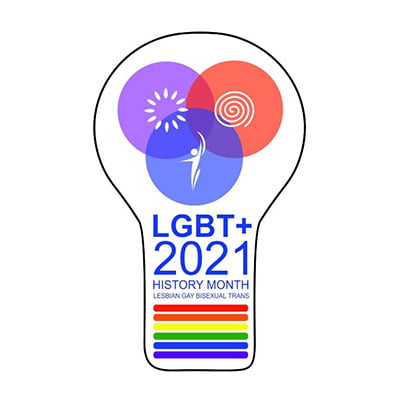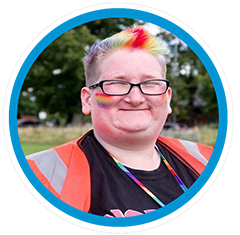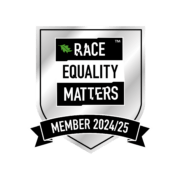Interview with Together service user Frankie on lived experience and LGBTQ+ History Month
February is LGBTQ+ History Month.

To mark that we wanted to share the lived experience of one of our service users who is part of the LGBTQ+ community considering what the month means to them. Frankie is a resident at Together’s Boudicca Court Supported Accommodation and was kind enough to share his experiences and thoughts on the month.
Frankie started attending a peer support LGBTQ+ group run as part of Together’s Norfolk Integrated Housing and Community Support Service in 2020 and at that stage was still known by his female name and used female pronouns. Frankie disclosed to Together staff and peers in the group that he identified as male earlier last year and started to explore this. Frankie decided to change his name and title by deed poll and so identifies as female to male transgender, and as gay.
Frankie is a member of Norfolk’s Police and Crime youth board and has used his lived experience of having a diagnosis of Borderline Personality Disorder to explain the stigma and discrimination he has faced because of this. He did an interview last year on local radio for Pride week on the experience of coming out as transgender and had mentioned to Together staff how the peer support group had helped him feel inspired to be able to do that. Frankie has also recently set up an LGBTQ+ support group for adults himself in West Norfolk which was organised by King’s Lynn & West Norfolk Pride, as for quite a long time there was nothing in our area for over 25’s with a mental health focus.
 We began the interview by asking Frankie about the influence the LGBTQ+ peer support group has had for him. He explained “the group has been really helpful and it’s been good to get feedback from people with similar experiences both of mental distress and who identify as part of the LGBTQ+ community too. That made it easier to open up and share things with them and I’ve been attending regularly since last may”. The group in question was one that had been mentioned in a previous interview we’d done with a staff member and Frankie confirmed he knew that person and that the residents and staff at Boudicca court had been supportive.
We began the interview by asking Frankie about the influence the LGBTQ+ peer support group has had for him. He explained “the group has been really helpful and it’s been good to get feedback from people with similar experiences both of mental distress and who identify as part of the LGBTQ+ community too. That made it easier to open up and share things with them and I’ve been attending regularly since last may”. The group in question was one that had been mentioned in a previous interview we’d done with a staff member and Frankie confirmed he knew that person and that the residents and staff at Boudicca court had been supportive.
Frankie described how he hadn’t been sure how people would react when he decided to come out as being transgender having previously identified as bi-sexual but still feeling he needed to make a change. He explained how he’d overhear strangers making assertions about his gender which was difficult to take. Frankie had been worried about telling his mum of his decision but said “she was great and really understanding” which was really important for him. When asked whether he feels his mental health is in a better place having come out, Frankie asks his support worker at Boudicca court, Jo, what she thinks. Jo responds positively and Frankie says “maybe, it’s hard to tell with everything with Covid going on but hopefully” graciously reminding the interviewer of the fairly big issue of the time they’d temporarily forgotten about.
In considering a question on whether identifying as part of the LGBTQ+ community has had an impact on his mental health either positively in terms of support and resilience or negatively through any discrimination Frankie first pays tribute to staff at Boudicca Court. “Everyone there has been really understanding and they really are just there to help” but then he explains how there had been some more difficult experiences in support services. Frankie has previously received a diagnosis of Borderline Personality Disorder and explained “the GP asked if the feeling I had that I wanted to transition was one of my personalities” which had been a hard conversation and he thought could have involved more understanding. He said he knew it was something he wanted to do though and has since been put on the waiting list for a gender clinic although the wait for that is 3 years as it’s one of the best clinics in London.
Finally we wanted to see what Frankie thought about LGBTQ+ history month itself and if there were important changes that had been made and what else still needed to be addressed to which Frankie said “there is still discrimination against the community and that needs to change”. He explained how within coming out friendship groups are really important and “relationships can change as you don’t know how people will react until you speak to them, some have been really great.”
In reflecting on what has changed Frankie asks Jo who points out that until 50 years ago identifying as LGBTQ+ would have been considered a mental disorder so clearly there has been progress which Frankie agrees with. At that point Frankie points out that “my social worker and care coordinator have been really good though and keen to learn as they go without stereotyping” which shows how other support services have developed more understanding. Finally to end the interview Frankie reiterates how the staff at Boudicca Court have been really understanding and supportive.
We want to say a big thank you to Frankie and to Jo for taking part in the interview and offering so much insight.


